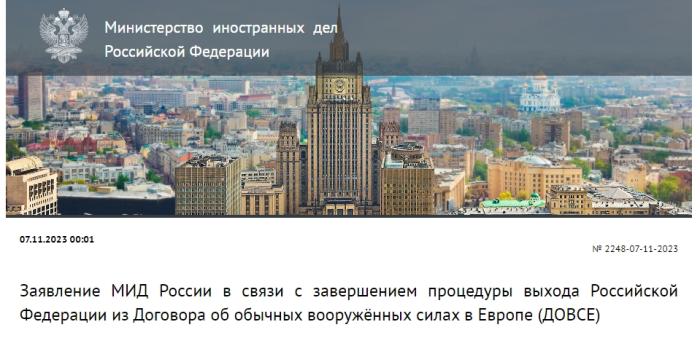
Russia's Foreign Ministry issues a statement saying that the process of the formal withdrawal from theTreaty on Conventional Armed Forces in Europe (CEF) has been completed on November 7, local time. (Photo from the website of Russia's Foreign Ministry)
Russia formally withdrew from the Treaty on Conventional Armed Forcesin Europe (CFE) at midnight on November 7, local time. Russian Deputy Foreign Minister Sergei Ryabkov previously stated that due to changing circumstances, the treaty had become contradictory to Russia's security interests. "Those who still hope for Russia to return to the treaty are having a delusion," said Ryabkov.
The CFE was born during the Cold War when the two major military groups, NATO, and the Warsaw Pact, were having a long-standing confrontation. It was seen by the West as a "cornerstone of European security." Because of NATO's continued eastward expansion, Russia decided to suspend the treaty's implementation in 2007. Ryabkov previously stated that the treaty had become "hopelessly outdated and a relic" in the face of deteriorating military and political situations in Europe due to actions by Western countries.
Wang Xiaoquan, a researcher at the Institute of Russian, Eastern European and Central Asian Studies at the Chinese Academy of Social Sciences, believes that Russia’s withdrawal from the treaty serves primarily as a political statement that demonstrates Russia's tough stance on safeguarding national security. He pointed out that although the CFE was interpreted as the "cornerstone of European security," the real cornerstone of European security is mutual trust.
Currently, there is no mutual trust between Russia and the West led by the US, and the treaty has long been non-existent. He noted that a series of treaties, including the Strategic Arms Reduction Treaty and the Anti-Ballistic Missile (ABM) Treaty, formed the arms control system between the US and the Soviet Union at that time. Today, Russia is fulfilling the obligations of that treaty system, while the leading NATO country, the US, has successively withdrawn from the ABM Treaty and the Intermediate-Range Nuclear Forces (INF) Treaty and refused to extend the New Strategic Arms Reduction Treaty. The arms control system built through decades of effort by both sides is now on the verge of collapse, and this may lead to major world powers intensifying the development and deployment of advanced weapon systems with higher accuracy, longer ranges, and greater destructive power.
As Russia announced its withdrawal from the CFE, the security situation in Europe remains far from optimistic. Under the continuous expansion of US-led NATO and the continuous military support to Ukraine, it is difficult to reach a resolution to end the crisis in Ukraine.
As a massive number of weapons flows into Ukraine from Europe, many European countries are also increasing their defense budgets. In 2022, Germany proposed a plan to increase defense spending to 2% of GDP. In 2023, the French parliament passed a Military Program Law that significantly increased defense spending. Poland also proposed that the amount of defense spending in 2024 will exceed four percent of GDP.
Wang believes that the crisis in Ukraine, triggered by NATO's ongoing eastward expansion, has now evolved into a "hybrid war, attrition war, and protracted war." He pointed out that the US and the West continue to escalate their military assistance and intelligence support to Ukraine, even sending many military advisers and organized mercenaries to intervenedirectly. At the same time, the US and the West have also worked closely to impose comprehensive and escalating extreme sanctions on Russia, including diplomatic warfare, media warfare, energy warfare, financial warfare, economic warfare, and technological warfare.
Wang pointedout that with these escalations, Russia's priority is to ensure national security, so it will not be constrained by the nominal CFE treaty. However, both Russia and European countries are facing economic challenges now, and while they will increase defense spending as the situation requires, the purpose of increasing defense spending is not to prepare for "total war" but to gain the upper hand.
In its statement on the withdrawal from the CFE, the Russian Foreign Ministry said that it is currently impossible to reach an agreement with NATO member countries on arms control. Only when reality forces them to return to a constructive and realistic position, can dialogue be resumed to create a new European security system that is in line with Russia's interests and the interests of all non-West manipulated countries.
Editor's note: Originally published on chinanews.com, this article is translated from Chinese into English and edited by the China Military Online. The information and opinions in this article do not necessarily reflect the views of eng.chinamil.com.cn.













